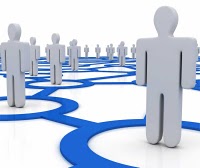 In my last two blogs I've shown you how we became Cyborgs by inventing machines to extend our capabilities and how our most advanced machine, the Internet, is almost evolving into it's own intelligent entity - note the word almost. It's more simple like a single cell organism at the moment.
In my last two blogs I've shown you how we became Cyborgs by inventing machines to extend our capabilities and how our most advanced machine, the Internet, is almost evolving into it's own intelligent entity - note the word almost. It's more simple like a single cell organism at the moment.
In the next few blogs I want to examine how we're presently using the Internet and what new modes of communication have been created that are changing the World as we know it. What this will do is give a background to the more In Real Life (IRL) human aspects of the Internet and I'm hoping that what I discover by writing it will spurn multiple new blog subjects that I can think about for 2011.
"There is no such thing as a single, monolithic, online subculture; it's more like an ecosystem of subcultures, some frivolous, others serious. The cutting edge of scientific discourse is migrating to virtual communities, where you can read the electronic pre-preprinted reports of molecular biology and cognitive scientists. At the same time, activists and educational reformers are using the same medium as a political tool." (Rhiengold p.274)
There are many types of virtual communities on the Internet ranging from the congregation of 3D Avatars in Second Life to Prosumers creating video content for YouTube. Characteristics of a community are that they:
- Share language and codes
- Have repeated participation
- Shared spaces
- Have common relationships
- Have webs of personal relationships
These new virtual communities are now combining with our real world communities which has caused some significant changes to society. If the invention of the Gutenberg Press spurned a knowledge revolution then the Internet knowledge revolution will dwarf it by comparison. Scientist's can now liaise with each other instantly on a global scale within their own specialist virtual communities and all known knowledge is being added to the Internet as quickly as possible. In our lifetime we'll see inventions that we can't even comprehend at this time because of this new environment.
"What makes social network sites unique is not that they allow individuals to meet strangers, but rather they enable users to articulate and make visible their social networks." (Boyd, D. p.69)
How does this new environment of virtual communities influence our off-line world? One aspect is the shift in political power from the private to the public. For example, previously Government's could shape the views of it's citizens because they controlled the mass media such as film, television and radio. One of the earliest examples of this can be seen in the Nazi movement when Joseph Goebbels Principles of Propaganda were used in the Leni Reifenstahl's propaganda film "Triumph Des Willens (1934)". More recent examples might be how the the Gulf War (the Nintedo war) was portrayed on television. However new virtual communities such as Facebook Groups or even Thin Media such as Greenpeace newsletters and blogs are now mobilising citizens to take action. This shift in power is now influencing the way corporations prepare media releases and is forcing Governments to be more transparent.
An example of this change in power can be seen in the recent Cadbury palm oil controversy. At the start of the controversy Cadbury took a very unconvincing stand-point that the Palm Oil was sustainable and the reason for it's addition was because it created a softer bite. 10 years ago they may have been able to propose such ideas because it was difficult for smaller organisations to challenge them through mass media but in the age of the Internet such behaviour comes under far closer scrutiny. Within days Facebook Groups, online petitions, and unflattering media articles revealed Cadbury's recent financial losses and the truth about their palm oil which were more likely the reasons they changed their recipe. Even Auckland Zoo and Orana Park in Christchurch banned Cadbury chocolate which were key factors for Cadbury to change it's position and bring back the old recipe.
These online communities such as Second Life also challenge our very identities because they allow people to shed their gender by choosing an alternate gender Avatar or even become animals. Within this virtual world we can experience what it's like to be schizophrenic or trial a new invention before it has been created in the real world. These online communities are providing new spaces for humanity to learn and experience which transforms our perceptions of the real world. If the invention of language transformed humans from simple animals to the most powerful animal on the planet then these new virtual spaces on the Internet may signal a new evolution for mankind.
However, it may also have the opposite effect. It may imprison us within a reality that we can't escape. Unlike the film The Matrix (1999) where humans are unwittingly living in a virtual world whilst their physical bodies are harvested for electricity, we are already in a virtual world that we've created for ourselves that most people don't realise exists - refer to my previous "We are Cyborgs" blog. In the next few blogs I'll address some examples of how our machines may actually be controlling us.
Bibliography
Boyd, Danah M. Social Network Sites: Definition, History and Scholarship, Journal of Computer Mediated Communication, 13(1), article 11. From 154.311 New Media book of readings. Massey University, Palmerston North.
Rhiengold, Howard. "The Virtual Community". Reading Digital Culture. Ed. David Trend. Massachusetts: Blackwell, 2001. pp. 272-280. From 154.311 New Media book of readings. Massey University, Palmerston North.
 About
About
Brynn Like this post? Share with your friends: 


 In my last two blogs I've shown you how we became Cyborgs by inventing machines to extend our capabilities and how our most advanced machine, the Internet, is almost evolving into it's own intelligent entity - note the word almost. It's more simple like a single cell organism at the moment.
In my last two blogs I've shown you how we became Cyborgs by inventing machines to extend our capabilities and how our most advanced machine, the Internet, is almost evolving into it's own intelligent entity - note the word almost. It's more simple like a single cell organism at the moment. About
About

